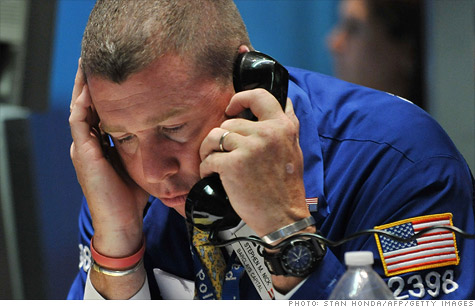Search News

Investors aren't the only ones worried about the U.S. economy. Economists are raising the odds of a double dip recession and predicting it would be an especially painful downturn.
NEW YORK (CNNMoney) -- The risk of double dip recession is rising.
And while economists disagree on just how likely the U.S. economy is to fall into another downturn, they generally agree on one thing -- a new recession would be worse than the last and very difficult to pull out of.
"Going back into recession now would be scary, because we don't have the resources or the will to respond, and our initial starting point is such a point of weakness," said Mark Zandi, chief economist at Moody's Analytics. "It won't feel like a new recession. It would likely feel like a depression."
Zandi said the recent sell-off in stocks have caused him to raise the odds of a new recession to 33% from 25% only 10 days ago.
Other economists surveyed by CNNMoney are also raising their recession risk estimates. The survey found an average chance of a new recession to be about 25%, up from a 15% chance only three months ago.
Of the 21 economists who responded to the survey, six have joined Zandi in increasing their estimates in just the last few days. The main reason: the huge slide in stocks. Standard & Poor's downgrade of the U.S. credit rating is another concern.
"The correction in equity markets raises the risk of recession due to the negative hit to wealth and confidence," said Sal Guatieri, senior economist for BMO Capital Markets.
Even with a 430-point rebound in the Dow Jones industrial average Tuesday following the Federal Reserve meeting, major U.S. stock indexes have lost more than 11% of their value over the last 12 trading days.
A plunge in stocks doesn't necessarily mean a new recession. The economy avoided a recession after the stock market crash of 1987.
"Stock price declines are often misleading indicators of future recessions," said David Berson, chief economist of BMI Group.
But with the economy already so fragile, the shock of another stock market drop and resulting loss of wealth could be the tipping point.
"It really does matter where the economy is when it gets hit by these shocks," said Zandi. "If we all pull back on spending, that's a prescription for a long, painful recession," he said.
Most economists say they aren't worried that S&P's downgrade makes recession more likely, although a few said any bad news at this point increases the risk.
"The downgrade has a psychological impact in terms of hurting consumer confidence," said Lawrence Yun, chief economist with the National Association of Realtors.
Another recession could be even worse than the last one for a few reasons.
For starters, the economy is more vulnerable than it was in 2007 when the Great Recession began. In fact, the economy would enter the new recession much weaker than the start of any other downturn since the end of World War II.
Unemployment currently stands at 9.1%. In November 2007, the month before the start of the Great Recession, it was just 4.7%.
And the large number of Americans who have stopped looking for work in the last few years has left the percentage of the population with a job at a 28-year low.
Various parts of the economy also have yet to recover from the last recession and would be at serious risk of lasting damage in a new downturn.
Home values continue to lose ground and are projected to continue their fall. While manufacturing has had a nice rebound in the last two years, industrial production is still 18% below pre-recession levels.
There are nearly 900 banks on the FDIC's list of troubled institutions, the highest number since 1993. Only 76 banks were at risk as the Great Recession took hold.
But what has economists particularly worried is that the tools generally used to try to jumpstart an economy teetering on the edge of recession aren't available this time around.
"The reason we didn't go into a depression three years ago is the policy response by Congress and the Fed," said Dan Seiver, a finance professor at San Diego State University. "We won't see that this time."
Three times between 2008 and 2010, Congress approved massive spending or temporary tax cuts to try to stimulate the economy. But fresh from the bruising debt ceiling battle and credit rating downgrade, and with elections looming, the federal government has shown little inclination to move in that direction.
So this new recession would likely have virtually no policy effort to counteract it. ![]()
| Overnight Avg Rate | Latest | Change | Last Week |
|---|---|---|---|
| 30 yr fixed | 3.80% | 3.88% | |
| 15 yr fixed | 3.20% | 3.23% | |
| 5/1 ARM | 3.84% | 3.88% | |
| 30 yr refi | 3.82% | 3.93% | |
| 15 yr refi | 3.20% | 3.23% |
Today's featured rates:
| Latest Report | Next Update |
|---|---|
| Home prices | Aug 28 |
| Consumer confidence | Aug 28 |
| GDP | Aug 29 |
| Manufacturing (ISM) | Sept 4 |
| Jobs | Sept 7 |
| Inflation (CPI) | Sept 14 |
| Retail sales | Sept 14 |